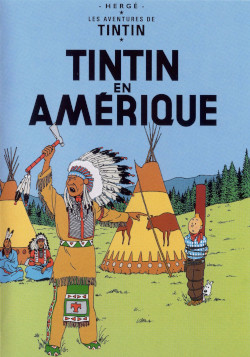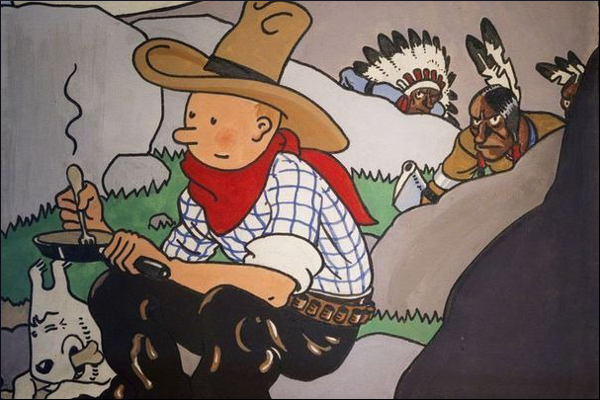
- Tintin en Amérique
- Published by: Egmont Books
- Level: Beginner
- First Published in: 1945
Hergé created Tintin en Amérique, the second story in the Tintin series, in 1945. We are immediately introduced to Tintin’s nemesis, Al Capone, who was already trying to get rid of Tintin in the previous episode.

Hergé created Tintin en Amérique, the second story in the Tintin series, in 1945. We are immediately introduced to Tintin’s nemesis, Al Capone, who was already trying to get rid of Tintin in the previous episode. His henchmen attack Tintin immediately when he arrives in Chicago. They catch him and exclaim, “L’oiseau est pris.” (That is, he’s been trapped like a caged bird.) Tintin escapes and, startled, the henchmen shout, “Zut! Quelle guigne!” “Zut” is comparable to “darn,” an expression now considered light and childish and slowly becoming antiquated. “Guigne” means that a situation has been jinxed or spoiled by bad luck.
"It can be quite confusing, because lots of old-fashioned insults are used"
It is quite common to read one-liners in Tintin adventures, especially during chase scenes. It can be quite confusing, because lots of old-fashioned insults are used. Tintin is called a “petit freluquet” (a man not worth considering) and a “gaillard” (a bruiser). Tintin, in turn, calls the gangster a “gredin” (a rascal), while the gangster mutters to himself, “Bon sang de bon sang,” a curse expressing surprise, similar to “damn it,” which used to have a religious connotation relating to the blood of Christ. The gangster also curses, “Mille millions d’ananas,” which has no ulterior meaning but which may foreshadow a famous utterance by Tintin’s later and eventual partner, Captain Haddock: “Mille milliers de milles sabords.” As the story progresses, Tintin traps the bandits and seeks help from a policeman, who doesn’t believe Tintin could have trapped Al Capone’s henchmen. So, the policeman shouts for “la voiture cellulaire,” that is, for the ambulance to take the protagonist to a mental institute.

Tintin lies low, catches a hired killer, and convinces the police to take the prisoner away. The police tell Tintin that he needs to come along as a formality, which Tintin believes is quite “louche,” an expression meaning “sketchy” and also the word for “ladle.” Tintin doesn’t trust the cops, suspecting they are fake. Later on, he evades the bad guys by putting up a mannequin of himself by his hotel window. It is shot to bits, and Tintin compares it to an “écumoire,” a kitchen utensil similar to a ladle but with holes on it. Tintin follows the clues to the gang boss, Bobby Smiles, and ends up in a Native American reservoir, with a clan named “Le Peaux-Rouges,” the Red Skins. Tintin, awestruck at getting to be around Native Americans, takes lots of pictures, while Milou, his talking dog, adopts a more racist and snobbish stance, turning up his nose at the thought of speaking with Red Skin dogs, uttering, “S’ils se figurant que je vais adresser la parole à des chiens peaux rouges!” Bobby Smiles later chases Tintin to a cliff near the reservoir and watches him fall. He professes, “Voila une heureuse chute,” which one can say about a story that ends happily, though there is wordplay in this case, since Bobby Smiles also means that he’s happy that Tintin “chute” (fell).
"Modernity and capitalism take over, and after a satirical two-day overhaul, the Far West is turned into a metropolitan city."
Towards the end, Hergé makes a socioeconomic comment about oil reservoirs on Indian Reservations, as Tintin accidentally discovers oil. Because of this, modernity and capitalism take over, and after a satirical two-day overhaul, the Far West is turned into a metropolitan city. A policeman in this new urban settlement compares Tintin’s attire to that of a transvestite, as Tintin is still clothed in his cowboy outfit: “Dites donc, vous ne savez sans doute pas que les travesties sont interdits dans la ville? Vous vous croyez sans doute au Far-West!” (Come on, don’t you know that transvestites are forbidden in the city? No doubt you think you’re in the Far West!
